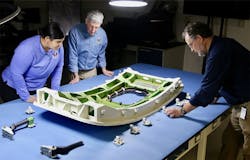A flight will leave St. Louis later this month, one of hundreds that day and every day, with thousands of passengers aboard jets that may not be airworthy. Now, statistically, commercial aerospace accidents are so few that we should not fret too much about flight safety. But I am booked on that St. Louis flight – aboard a Boeing 737 MAX 8 – so I’m concerned.
That’s not the 737 model that lost a door panel mid-flight earlier this year. And no one was injured then. So what are passengers to do with this information? Who was wronged? Is anyone responsible?
There is a background to our concern. The 737 MAX 8 is the model introduced less than a decade ago as a fresh design approach, and yet it was involved in two deadly accidents just about two years later, both determined to have been caused by an automated flight-control program. Those crashes killed 346 passengers and crew members, put all 737 MAX jets on the ground for 20 months, and cost Boeing dearly in revenues it could not collect, in unrealized opportunities with airlines, and in judgments handed down for its liability in the two incidents.
I’m sure I am not the only one who is wary of boarding a 737 MAX – but so what? Boeing doesn’t owe an explanation to passengers. We’re not customers.
Boeing’s customers are the airlines that buy or lease the 737s – and apart from compensating or incentivizing them the jet builder has no way to address their concerns. And what can customers do except cancel future orders? They would spite themselves in various ways.
Understand the further dimensions of this problem: the commercial aircraft market is booming. Global demand is forecast to double the number of jets in service over the next 20 years. More than that, thanks to several decades of consolidation and regulatory consent, Boeing has only one true competitor. Even if the company does not keep every customer perfectly happy all the time it still is assured of an enormous share of global demand. Just like me booking weeks ahead of my trip, aircraft operators or leasing groups are rushing to place orders so that they’ll have a place in the production schedule. The 737 MAX jet accounts for over 4,700 orders yet to be completed.
Everything should be looking up, but Boeing cannot convince the world it should be trusted. Regulators and inspectors are infiltrating its manufacturing operations now, evaluating everything and adding to the suspicion by their presence there.
And of course there are the analysts and investors, who may or may not care about aircraft safety but will not tolerate bad news that affects asset valuations. For them, Boeing’s chairman and CEO, and other highly visible executives are being sacrificed – which may be justified but is not a move that will assuage jet buyers or soothe anxious passengers.
I hope Boeing can undo this knot of impossible expectations and unrealistic demands. But I conclude that it’s simply a present-day re-staging of the Icarus myth, of failing to imagine the limits of our abilities, that there are things we cannot control, and failing to remember that perfection is inhuman.
About the Author
Robert Brooks
Content Director
Robert Brooks has been a business-to-business reporter, writer, editor, and columnist for more than 20 years, specializing in the primary metal and basic manufacturing industries. His work has covered a wide range of topics, including process technology, resource development, material selection, product design, workforce development, and industrial market strategies, among others.
